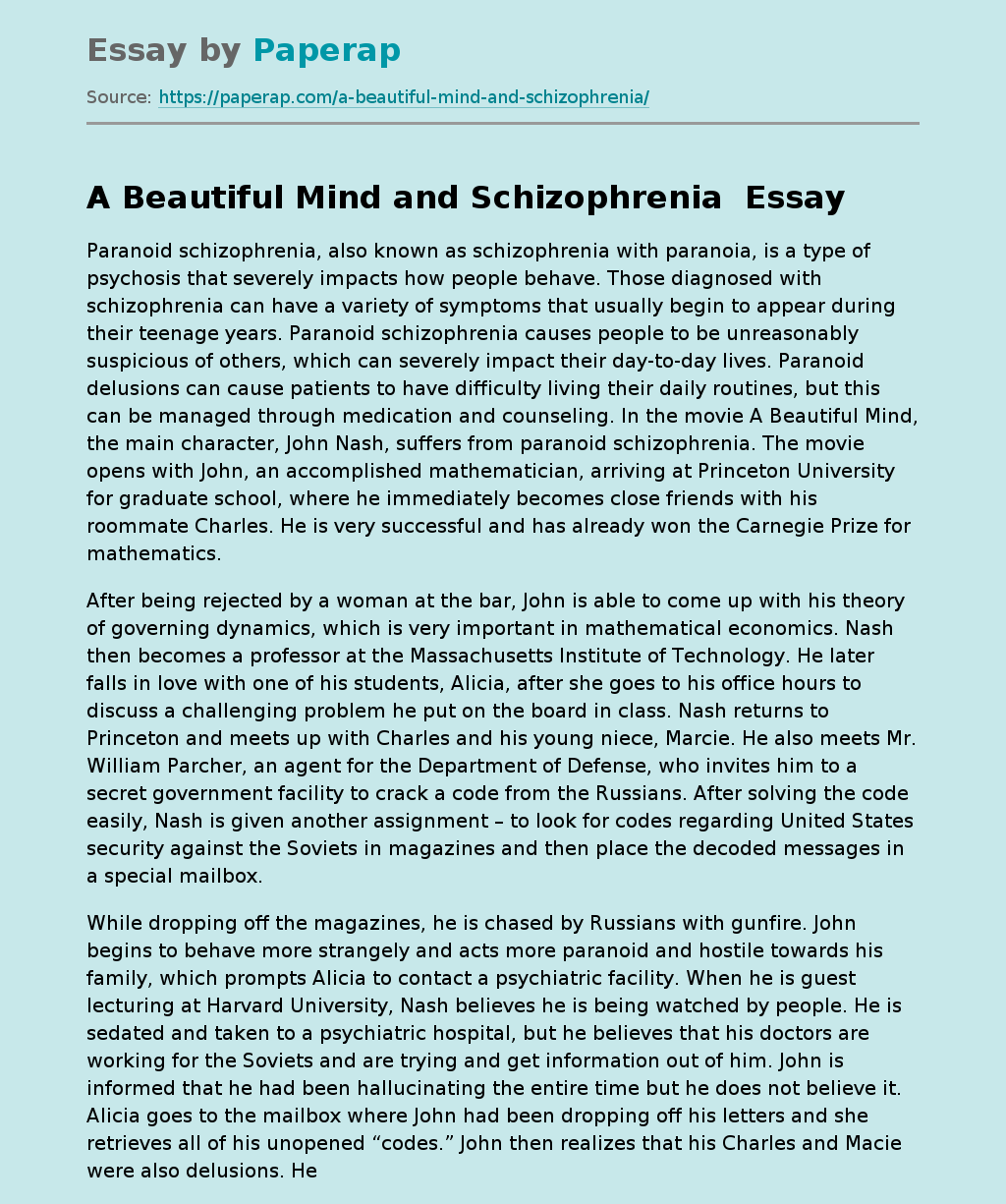A Beautiful Mind and Schizophrenia
Paranoid schizophrenia, also known as schizophrenia with paranoia, is a type of psychosis that severely impacts how people behave. Those diagnosed with schizophrenia can have a variety of symptoms that usually begin to appear during their teenage years. Paranoid schizophrenia causes people to be unreasonably suspicious of others, which can severely impact their day-to-day lives. Paranoid delusions can cause patients to have difficulty living their daily routines, but this can be managed through medication and counseling. In the movie A Beautiful Mind, the main character, John Nash, suffers from paranoid schizophrenia.
The movie opens with John, an accomplished mathematician, arriving at Princeton University for graduate school, where he immediately becomes close friends with his roommate Charles. He is very successful and has already won the Carnegie Prize for mathematics.
After being rejected by a woman at the bar, John is able to come up with his theory of governing dynamics, which is very important in mathematical economics. Nash then becomes a professor at the Massachusetts Institute of Technology.
He later falls in love with one of his students, Alicia, after she goes to his office hours to discuss a challenging problem he put on the board in class. Nash returns to Princeton and meets up with Charles and his young niece, Marcie. He also meets Mr. William Parcher, an agent for the Department of Defense, who invites him to a secret government facility to crack a code from the Russians. After solving the code easily, Nash is given another assignment – to look for codes regarding United States security against the Soviets in magazines and then place the decoded messages in a special mailbox.
While dropping off the magazines, he is chased by Russians with gunfire. John begins to behave more strangely and acts more paranoid and hostile towards his family, which prompts Alicia to contact a psychiatric facility. When he is guest lecturing at Harvard University, Nash believes he is being watched by people. He is sedated and taken to a psychiatric hospital, but he believes that his doctors are working for the Soviets and are trying and get information out of him. John is informed that he had been hallucinating the entire time but he does not believe it. Alicia goes to the mailbox where John had been dropping off his letters and she retrieves all of his unopened “codes.” John then realizes that his Charles and Macie were also delusions. He is treated with insulin shock therapy and given anti-psychotic medicines which dull his ability to do his work. Because of this, he secretly stops taking his medication which leads to a relapse. The hallucinations come back and John begins trying to break codes again, but then he realizes that Macie never gets older and that she was never real.
He says goodbye to all of his hallucinations and thanks to Charles for being his best friend over the years. He agrees to stop speaking to them and to continue taking his medications. When he is older, he returns to Princeton University to audit classes and eventually gets to teach again. John earned the Nobel Prize in Economics for his work on Game Theory. He learns to manage his disease and is able to live a relatively normal life. John Nash suffered from schizophrenia, which caused many unhealthy behaviors in the film. He exhibited many of the common symptoms of paranoid schizophrenia, which include: “delusions of persecution, reference, exalted birth, special mission, bodily change, or jealousy; hallucinatory voices that threaten the patient or give commands, or auditory hallucinations without verbal form, such as whistling, humming, or laughing; hallucinations of smell or taste, or of sexual or other bodily sensations; visual hallucinations may occur but are rarely predominant”.
John suffered from delusions of persecution by the Soviets, the special code-breaking missions, and many hallucinations in the form of Charles, Macie and Parcher. The cause of schizophrenia is unknown, but it is believed to be a combination of genetics, brain chemistry and environment. Different brain chemicals, such as dopamine and glutamate, may contribute to whether or not someone has schizophrenia. There are some factors that can increase the risk of developing schizophrenia. These factors include a family history of schizophrenia, increased immune system activation, older father, pregnancy or birth complications, and mind-altering drugs during young adulthood.
Without treatment, schizophrenia can lead to suicide, anxiety, OCD, depression, substance abuse, isolation, medical problems or aggressive behavior. This disorder requires a lifetime of treatment, even though the patient may feel better. Schizophrenia can be treated with antipsychotic medications, hospitalization and electroconvulsive therapy. Additionally, patients require work with a psychologist, social worker and psychiatric nurse. Approximately 1.2% of Americans have been diagnosed with schizophrenia. People who suffer from schizophrenia, such as John Nash, are able to live and function with their condition if given the right treatment. Although schizophrenia is a very serious condition, it can be managed and patients can try to live a relatively normal life. A Beautiful Mind is able to tell the story of John Nash’s life and chronicles his mental health and personal life.
Works Cited
- Grazer, B. (Producer), Howard, R. (Director) & Goldsman, A. (Writer). (2001). A Beautiful Mind [Video file]. Retrieved November 17, 2018.
- Mayo Clinic. (2018, April 10). Schizophrenia. Retrieved November 25, 2018, from https://www.mayoclinic.org/diseases-conditions/schizophrenia/symptoms-causes/syc-20354443
- WebMD. (n.d.). What Is Paranoid Schizophrenia? Retrieved November 17, 2018, from https://www.webmd.com/schizophrenia/guide/schizophrenia-paranoia#1
- World Health Organization. (n.d.). Schizophrenia. Retrieved November 25, 2018, from http://www.schizophrenia.com/szparanoid.html
A Beautiful Mind and Schizophrenia . (2021, Dec 13). Retrieved from https://paperap.com/a-beautiful-mind-and-schizophrenia/

